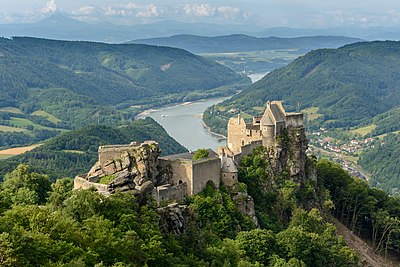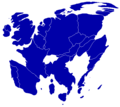Portal:European Union
Introduction
The European Union (EU) is a supranational political and economic union of 27 member states that are located primarily in Europe. The Union has a total area of 4,233,255 km2 (1,634,469 sq mi) and an estimated total population of over 449 million. The EU has often been described as a sui generis political entity combining the characteristics of both a federation and a confederation. Containing 5.8% of the world population in 2020, EU member states generated a nominal gross domestic product (GDP) of around US$16.6 trillion in 2022, constituting approximately one sixth of global nominal GDP. Additionally, all EU states except Bulgaria have a very high Human Development Index according to the United Nations Development Programme. Its cornerstone, the Customs Union, paved the way to establishing an internal single market based on standardised legal framework and legislation that applies in all member states in those matters, and only those matters, where the states have agreed to act as one. EU policies aim to ensure the free movement of people, goods, services and capital within the internal market; enact legislation in justice and home affairs; and maintain common policies on trade, agriculture, fisheries and regional development. Passport controls have been abolished for travel within the Schengen Area. The eurozone is a group composed of the 20 EU member states that have fully implemented the economic and monetary union and use the euro currency. Through the Common Foreign and Security Policy, the union has developed a role in external relations and defence. It maintains permanent diplomatic missions throughout the world and represents itself at the United Nations, the World Trade Organization, the G7 and the G20. Due to its global influence, the European Union has been described by some scholars as an emerging superpower. In 2012, the EU was awarded the Nobel Peace Prize. The United Kingdom became the only member state to leave the EU, in 2020; ten countries are aspiring or negotiating to join it. (Full article...) Selected article The economy of the European Union combines the economies of 28 member states and is generating an estimated nominal GDP of €12.8 trillion in 2012 according to the Eurostat. It accounts for about 31% of the world's total economic output. 18 member states adopted a single currency, the euro, managed by the European Central Bank. The EU economy consists of a single market and is represented as a unified entity in the WTO. Selected picturePhotograph credit: Uoaei1 Aggstein Castle is a ruined castle on the right bank of the Danube in Wachau, Austria. It was built in a strategic position on a rocky crag in the 12th century, but little of the original structure remains. In 1429, it was razed and rebuilt by Jörg Scheck von Wald, and the three-storey women's tower, the palace and the Gothic chapel date back to this period, as does the famous rose garden. Anna Freiin von Polheim und Parz carried out renovations in the early 17th century, but after her death, the building deteriorated and stones and timber were removed for use in the construction of a nearby Servite convent.
Did you know?...that the President of Ireland, who serves as head of state, is elected for a seven year term and can be re-elected only once? ...that within the Eurozone the European Central Bank has the exclusive authority to set monetary policy? Selected cityBrussels is the capital of Belgium, of the French Community of Belgium, of the Flemish Community, and is the headquarters of the European Union's institutions. Brussels is in the centre of Belgium, and also the largest municipality of the Brussels-Capital Region. This municipality inside Brussels is correctly named The City of Brussels, which is one of 19 municipalities that make up the Brussels-Capital Region, with a total population of 1,018,804 inhabitants (1 January 2006). The municipality has a population of about 140,000. The Metropolitan area has about 2,090,000 inhabitants. Brussels is also the political seat of NATO, the Western European Union (WEU) and EUROCONTROL, the European Organisation for the Safety of Air Navigation. In 977 AD, the Holy Roman emperor Otto II gave the duchy of Lower Lotharingia on the empire's western frontier to Charles, the banished son of King Louis IV of France. Mention was already made of Brussels at the time: Bishop Saint-Gery of Cambrai-Arras settled a chapel on a small island (695). However, the founding of Brussels is usually said to be when a small castle was built by Charles around 979 on Saint-Géry island in the Zenne or Senne river. General imagesThe following are images from various European Union-related articles on Wikipedia.
TopicsFeatured contentFeatured articles
Featured lists
Featured contentGood articles
CategoriesRelated portalsAssociated WikimediaThe following Wikimedia Foundation sister projects provide more on this subject:
Discover Wikipedia using portals |
































































